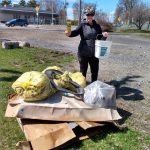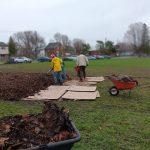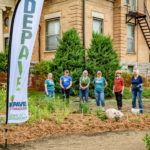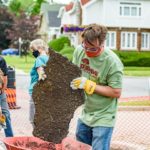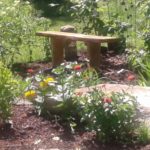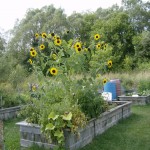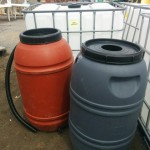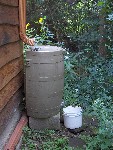 REAL has been instrumental in developing specific information to help rural residents conserve and protect our water.
REAL has been instrumental in developing specific information to help rural residents conserve and protect our water.
Find out rain barrels can help you save money and conserve water.
Outdoor Water Conservation Tips
“A single lawn sprinkler spraying 19 litres per minute uses 50% more water in just one hour than a combination of ten toilet flushes, two 5-minute showers, two dishwasher loads, and a full load of clothes.” (Environment Canada)
In the summer municipal water use doubles because people are watering lawns and gardens, washing cars and filling swimming pools. This costs you and other taxpayers more, and may lead to water restrictions. If you use a well and septic system, reducing water use will reduce the chance of your well going dry, and be easier on your septic system. Here are some tips for reducing your outdoor water use.
- General
- Lawns
- Trees, Shrubs and Flower Gardens
- Plan a More Water-Efficient Garden
- Other Outdoor Activities
- leave a container in your yard to monitor the rainfall you have actually received so you will know when and how much water is really required
- pay attention to any municipal watering restrictions
- use a sprayer attachment on the end of your hose so hose will not be running when you don’t need it
- water wand attachments allow you to direct water where it is needed
- water early or late in the day to reduce evaporation, and water on calm days
- avoid watering hard surfaces like driveways and patios
- water slowly so that soil absorbs the water and it doesn’t just run off
- water low to the ground, with a soaker hose (a hose with small holes in it)
- check your hose for leaks or blockages
- collect rainwater from your roof in a rain barrel
- wash dishes, fruits and vegetables in a basin and use the greywater on trees and bushes
- use water from your dehumidifier on outdoor plants
- recycle water from children’s wading pools onto plants
- if your property is large and budget allows, consider an irrigation system that delivers water slowly, and more directly to the plant roots and on a timer
- lawns need about 2.5 cm. of water per week. Skip watering the week after a good rain. If you water, place a tuna can on your lawn and stop when it is full.
- if an established lawn turns brown from lack of water it is dormant, not dead, and will recover
- watering thoroughly and less frequently encourages deep roots
- avoid mowing and unnecessary traffic on your lawn when it is dry
- don’t cut your lawn too short or too often. Lawns over 6 cm. shade the roots so that they are better able to hold water
Trees, Shrubs and Flower Gardens
- give more water less often. Water deeply to encourage deeper roots
- the roots of trees and shrubs needing the most water are within the top 30 cm. of soil and near or beyond the drip line (below the outer tips of the branches)
- choose native shrubs and trees to match the site conditions
- trees have reduced water requirements as the age. Generally 2-3 cm. per week in the first year of planting, 2 -3 cm every 2-3 weeks over the next four years, and 2-3 cm. a month for mature trees.
- build a rim of soil around plants to create a saucer like depression that holds waters
- perennials and vines should be watered well in their first year, but should be able to survive a drought. If you notice wilting or die back, water to a depth of 10-20 cm
- mulch garden surface to retain moisture
- replace lawn under trees with mulch so they won’t compete for water
Plan a More Water-Efficient Garden
- take into account shady vs. sunny, slopes vs. flat areas or depressions, consider areas that will be hard to water, drain paves surfaces to garden and lawn
- group plants with similar water needs
- add organic matter to your soil, if required, to improve its water retention
- avoid small or narrow lawn areas that are inefficient to water and replace with water efficient ground covers, perennials or shrubs OR use stone, wood chips or another substance that doesn’t require water
- avoid asphalt or concrete as they prevent rain from soaking in and reflect heat causing greater evaporation
- do some research to choose plants well adapted to your climate and site conditions
- use a broom, not a hose, to remove debris from paved surfaces such as driveways
- use a bucket and sponge to wash and rinse your car, not a hose
- cover swimming pools when not in use to reduce evaporation
- investigate solar showers

